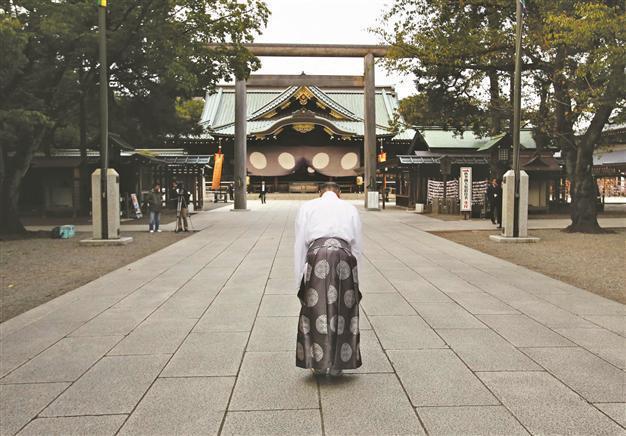China, Japan at odds over visit to Yasukuni war shrine
BEIJING / TOKYO - Agence France-Presse

A Shinto priest bows at the Yasukuni Shrine. Japanese Internal Affairs Minister Yoshitaka Shindo and more than 100 other lawmakers visited the site. REUTERS photo
China summoned Tokyo’s ambassador on Oct. 18 to protest over visits by a Japanese cabinet minister and scores of parliamentarians to the controversial Yasukuni war shrine, Beijing’s foreign ministry said.
“Vice Chinese Foreign Minister Liu Zhenmin has summoned the Japanese ambassador to China for a solemn protest and a strong condemnation,” spokeswoman Hua Chunying told reporters.
The visit “is a blatant attempt to whitewash Japanese militarism’s history of aggression and to challenge the outcomes of the Second World War and the post-war international order”, Hua added.
“China is resolutely opposed to that.” In Tokyo, Yoshitaka Shindo, minister for internal affairs and communications, insisted he was paying homage at the shrine as an individual, and had played down the potential for diplomatic fallout.
A cabinet minister was among scores of Japanese parliamentarians who paid tribute at a controversial war shrine in Tokyo on Oct. 18, in a move likely to anger China and South Korea.
Visit ‘private’ Yoshitaka Shindo, minister for internal affairs and communications, insisted he was paying homage at Yasukuni Shrine as an individual, and played down the potential for diplomatic fallout.
“I offered prayers in a private capacity,” Shindo, who wore a morning suit, told reporters after making his offering of a branch from a sacred tree.
“I mourned people who lost their lives in wars and prayed for peace,” said Shindo, whose grandfather, the commandant of a garrison on Iwojima, died in the infamous battle for the island.
Iwojima was a key staging post for the US military in its assault on Japan in the closing stages of World War II.
Asked if his visit to the shrine would affect Tokyo’s ties with other Asian countries, he said: “It’s not something that should provoke comments from anyone.” “I don’t think this will develop into a diplomatic issue at all.” The visits were part of the autumn festival at Yasukuni, which runs until Sunday.
Thousands of veterans from WWII or their bereaved families are expected to pay homage, while tourists, both domestic and foreign, will also visit.
Prime Minister Shinzo Abe on Oct. 17 donated a symbolic gift to the shrine, in what was taken as a sign that he would not be visiting. Yasukuni Shrine is the believed repository of the souls of about 2.5 million killed in war.
It is controversial because of the inclusion of 14 of the men held responsible for Japan’s often-brutal behavior as it invaded a swathe of Asia in the 1930s and 1940s.
In addition, the museum that is attached to the shrine peddles a largely unapologetic view of WWII that is not widely accepted, either at home or abroad.
Past misdeeds China and South Korea, whose peoples suffered under Japan’s militarist rule, say Yasukuni is a symbol of Tokyo’s present-day unwillingness to come to terms with its past misdeeds.
However, Japanese conservatives say it is natural that they pay homage to people who lost their lives in the service of their country, and insist the shrine is no different from Arlington National Cemetery, where the United States honors those killed in war.
Nationalists, among them a significant number of parliamentarians, visit the shrine in spring and autumn, as well as on August 15, the anniversary of Japan’s WWII surrender.
On Friday, about 160 members of parliament were at Yasukuni, accounting for more than 20 percent of the nation’s lawmakers.
A record 166 made the trip during April’s spring festival.
